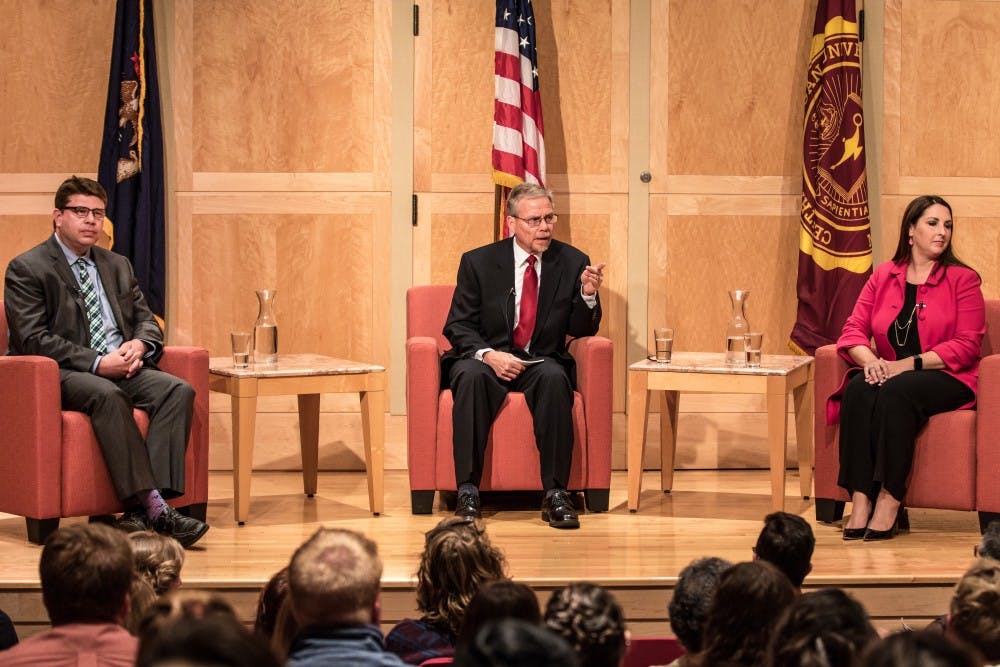Party Chairs: polarization influenced by social media use

Youth education in politics and how social media can affect voting trends were the topics of discussion of Monday night’s Griffin Policy Forum in the Charles V. Park Library Auditorium.
Sponsored by the College of Humanities & Social & Behavioral Sciences, panelists Ronna Romney McDaniel, chair of the Michigan Republican Party and Brandon Dillon, chair of the Michigan Democratic Party discussed the presidential election, party polarization and answered questions from the audiece.
Lawrence Sych, a political science and public administration faculty member, served as the panel moderator.
Romney McDaniel and Dillon began the night talking about how they first entered the political field and what their roles are as state party chairs. Both agreed trying to talk about politics in a non-partisan manner is essential for good discussion.
With the nature of the topic, however, they said it’s not possible.
Outside of the realm of politics, Romney McDaniel said people should do their best to not let their political lenses influence day-to-day life.
“Do you go through your life when you meet people and think ‘are they a Democrat? Are they a Republican? I don’t,” she said. “When I’m with my girlfriends, we talk about our kids, how’s school, our jobs or communities. I do think we have to work harder as parties to talk about the issues that matter to (voters) and not view issues as solely Democrat or Republican.”
The chairs began talking about the presidential election midway through the debate. Sych posed a question about voting tendencies, revealing Michigan is the fourth most politically polarized state in the country. He asked what the chairs thought about this issue, and whether they considered drastic polarization an issue at all.
Both Romney McDaniel and Dillon said the media is probably one of the leading causes of party polarization, especially social media.
“With the media, it used to be you only had three options for where you got your news: ABC, NBC or CBS. You had someone telling you the way it was and that’s the way it’s going to be,” Dillon said. “Now, if (I) get on my phone, I can find 150 articles to justify anything I’ve said (about politics), no matter how right or wrong it is. We tend to self-select more on what we’re exposed to.”
Romney McDaniel said she believes everything a person does, whether they’re conscious of it or not, is influenced by the government and its policies. Both agreed polarization makes it hard for a state to pass legislation and even harder for all residents of a state to approve of the new or pending laws.
Sych pointed to the fact this presidential election, both candidates have the lowest approval rates of any nominees in history, Dillon said that is sometomes ho politics works.
“The only way you’re going to get someone who (shares your same ideals), who looks like you, is if you yourself run for president,” he said.
The chairs said social media has changed things in terms of reaching the youth vote. Traditionally, political parties sent information to voters via mail and landline calls. This method of targeting still works with the Baby Boomers and Gen Xers, but fails when used on Millennials. Now, parties have to figure out new ways to reach the young vote, typically through electronic means like email, Twitter or Facebook.
Romney McDaniel emphasized how critical it is for young people to educate themselves and get engaged. Millennials don’t always pay attention to politics, but it effects them whether they realize it or not.
“The more we can educate, the better prepared they are to make decisions,” Romney McDaniel said.
The debate ended with questions being taken from the audience on notecards. Several of them brought up topics discussed earlier in the night, such as millennial voting engagement and if this presidential election could sour the opinion of young voters for years to come.
Holland sophomore Jenna Veldheer, who is majoring in Special Education, planned to attend the forum to earn extra credit for a class. By the end of the night, she said she was glad she attended.
“They did a good job at answering questions from all different views and not just one specific topic or idea,” Veldheer said.



